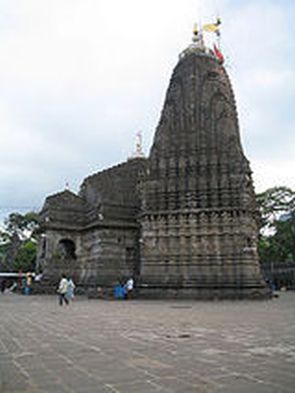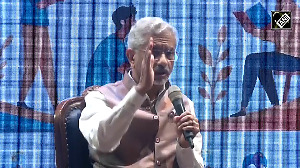 Amid campaigns against ban on women from entering the ‘chauthara’ of Shani Shingnapur shrine and certain restrictions for them at the Haji Ali dargah in Mumbai, the famous Trimbakeshwar temple in Maharashtra has also come into the spotlight for banning female devotees offering prayers in the inner sanctum.
Amid campaigns against ban on women from entering the ‘chauthara’ of Shani Shingnapur shrine and certain restrictions for them at the Haji Ali dargah in Mumbai, the famous Trimbakeshwar temple in Maharashtra has also come into the spotlight for banning female devotees offering prayers in the inner sanctum.
The ancient temple, located 30 kilometre from Nashik, is a major Lord Shiva shrine of the country, which has one of the 12 ‘jyotirlingas’, drawing devotees from far and wide.
Kailas Ghule, a member of the Trimbakeshwar Temple Trust said that the bar on entry of women into the ‘Garbhagriha’-- sanctum sanctorum -- is an age-old tradition and not something enforced in recent times.
Women, however, can have ‘darshan’ from outside the core area.
He said men too are not allowed into the core worship area for an hour daily between 6-7 am.
As per tradition, only men are allowed entry into the area where the main ‘linga’ is placed, that too by adorning a specific gear called the sovala (silk clothing).
According to Sanjay Shikhare, whose family has for long been engaged in performing ‘poojas’ and rituals at the temple, the ban goes back to the Peshwa period.
Even during the Kumbh Mela, many sadhvis offer prayers at Trimbakeshwar but from outside the ‘Garbhagriha’, he said.
Also, some purohits (priests) in the temple town said most of the women devotees may not want to defy the tradition.
Seeking to give a scientific dimension for the practice, they said there are certain rays that concentrate in the core, area which could probably be harmful to the health of women.
In December, while the build-up was on for the Shani Shingnapur campaign, two women -- Sujata Patil and her daughter-in-law Poonam -- wrote to TDT Chairman Urmila Joshi urging to lift the ban on women in the inner sanctum.
The temple authorities are yet to respond to their demand.
However, Joshi has formed a four-member committee to look into the matter and study the reasons behind the 400-year-old ban, said Lalita Shinde, one of the panel members and the first woman representative of TDT.
The Bhumata brigade, a women’s outfit spearheading the campaign against the ban on female devotees entering the sacred platform at Shani Shingnapur temple in Ahmednagar district submitted a memorandum to Chief Minister Devendra Fadnavis seeking his support to the move, after police foiled their attempt to storm the shrine.
The rights group’s high-voltage campaign was stalled on the Republic Day when police stopped the marchers at Supa village, 70 kilometre away from the shrine.
Political parties and spiritual gurus across the country have also backed their campaign, with Congress saying that it is the “pious duty” of whole society to support such a move.
A group of Muslim women on Thursday staged a protest in Mumbai demanding entry into a restricted area of the Haji Ali dargah.
Several activists belonging to Muslim women rights groups held placards demanding entry for females into the core area of the historic dargah, alleged it was “male patriarchy”, and not religion, which was imposing restrictions on women.
They also said the practice went against tenets of Islam and the Indian Constitution.
A Muslim women’s rights group is locked in a legal battle with trustees of the Haji Ali dargah, which has barred women’s entry into mosque’s mausoleum.
A petition challenging the Haji Ali Trust’s decision to ban the entry of women in the sanctum sanctorum of the dargah (grave of a male Muslim saint) is pending before the Bombay high court.
On January 18, the HC said it would wait for the Supreme Court’s ruling on entry of women in Sabarimala temple of Kerala before deciding on the plea related to the dargah.
At Sabarimala, which attracts millions of devotees during the peak pilgrim season in November to January, women of menstrual age are not allowed to go up the holy hillock and worship.
A few years back, a huge controversy erupted after a Kannada film actress claimed that she had worshipped at the hillshrine in the prime of her youth.











 © 2025
© 2025